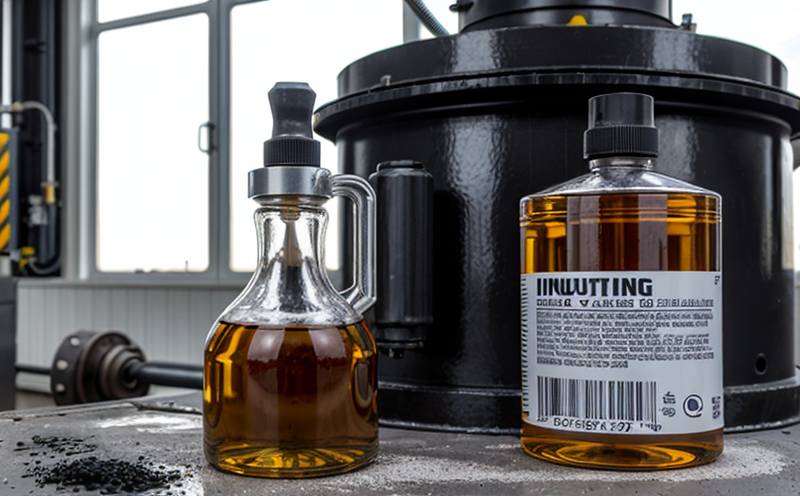BS EN ISO 12937 Water Content Testing of Oils
The BS EN ISO 12937 standard is specifically designed to determine the total water content in oils, which includes both dissolved and entrained water. This service plays a crucial role in ensuring the quality and performance of industrial oils, especially those used in machinery and equipment where moisture can lead to corrosion, degradation of additives, and reduced efficiency.
The test method described in BS EN ISO 12937 involves multiple steps that ensure accurate measurement. The process typically begins with sample preparation, which may include filtering the oil to remove particulates. This is followed by drying the sample under controlled conditions to evaporate the water content. The remaining mass of the sample is then reweighed, and the difference between the initial and final weights provides a measure of the water content.
The accuracy of this testing method is paramount in maintaining compliance with industrial standards. In many industries, such as aerospace, automotive, and manufacturing, adherence to these standards ensures that equipment operates efficiently and safely. The test results are often used to monitor the integrity of oil systems over time and to determine when maintenance or replacement is necessary.
Our laboratory follows this standard rigorously, using calibrated equipment to ensure precision and reliability in every measurement. By adhering to BS EN ISO 12937, we provide clients with accurate data that can be used for quality control and troubleshooting purposes.
- Aerospace
- Automotive
- Manufacturing
- Power Generation
- Mining
- Petrochemicals
- Construction
In addition to the testing process, we also offer detailed reports that include all relevant data points and insights. These reports are invaluable for quality managers, compliance officers, R&D engineers, and procurement teams who need to ensure they are meeting regulatory requirements and optimizing their operations.
Our laboratory is committed to providing high-quality, reliable services that meet the demands of our clients. By offering BS EN ISO 12937 water content testing for oils, we contribute to maintaining the integrity and performance of industrial machinery and equipment across various sectors.
Scope and Methodology
The scope of BS EN ISO 12937 water content testing is limited to the determination of total water content in oils. The standard covers both dissolved and entrained water, ensuring a comprehensive assessment of moisture levels in industrial lubricants.
The methodology for this test involves several key steps:
- Sampling: A representative sample of the oil must be taken from the equipment or storage vessel.
- Preparation: The sample is filtered to remove any particulates that could interfere with the testing process.
- Drying: The filtered sample is placed in a vacuum oven and dried at 103°C ± 2°C until constant weight is achieved. This ensures that all water content has been removed from the oil.
- Weighing: The weight of the dried sample is compared to the initial weight of the unfiltered sample to determine the total water content.
The results are expressed as a percentage by mass, providing clear and concise data for clients. This method ensures that any deviations in moisture levels can be identified promptly, allowing for timely corrective actions if necessary.
Our laboratory uses state-of-the-art equipment to perform these tests, ensuring accuracy and reliability. We also provide detailed reports that include all relevant data points and insights, making it easier for our clients to interpret the results and take appropriate action.
Industry Applications
The BS EN ISO 12937 water content testing is widely used across several industries where industrial oils are critical components. Here are some key applications:
- Aerospace Industry: Ensuring the quality of lubricants in aircraft engines and other systems.
- Automotive Sector: Maintaining the integrity of engine oils to enhance performance and longevity.
- Manufacturing: Monitoring the condition of hydraulic fluids to prevent malfunctions and downtime.
- Petrochemicals: Quality control in refining processes where water content can affect product quality.
- Mining Industry: Ensuring that lubricants used in mining equipment are free from moisture, which is crucial for safe operation.
- Construction Sector: Checking the water content of hydraulic fluids and greases to ensure they perform optimally under various conditions.
- Power Generation: Monitoring the quality of turbine oils to prevent corrosion and extend equipment lifespan.
In each of these industries, accurate water content testing is essential for maintaining performance standards and ensuring compliance with international regulations. Our laboratory provides this service with precision and reliability, supporting our clients in their efforts to maintain high-quality operations.
Eurolab Advantages
At Eurolab, we pride ourselves on providing exceptional water content testing services for oils. Here are some of the key advantages that our clients can expect:
- Precision and Reliability: Our state-of-the-art equipment ensures accurate and reliable test results.
- Compliance with Standards: We strictly adhere to BS EN ISO 12937, ensuring compliance with international standards.
- Detailed Reporting: Comprehensive reports that provide clear insights into the water content of your oil samples.
- Expertise and Experience: Our team of experienced professionals brings extensive knowledge and expertise to every test.
- Timely Turnaround: We understand the importance of timely results, providing quick turnaround times for our clients.
- Custom Solutions: Tailored testing services that meet the specific needs of your industry and equipment.
- Cost-Effective: Our competitive pricing ensures that you get high-quality service without breaking the bank.
With Eurolab, you can trust that your industrial oil samples are being tested with the highest level of accuracy and care. Our commitment to excellence is reflected in every test we conduct, ensuring that you receive reliable data to support your quality control efforts.





